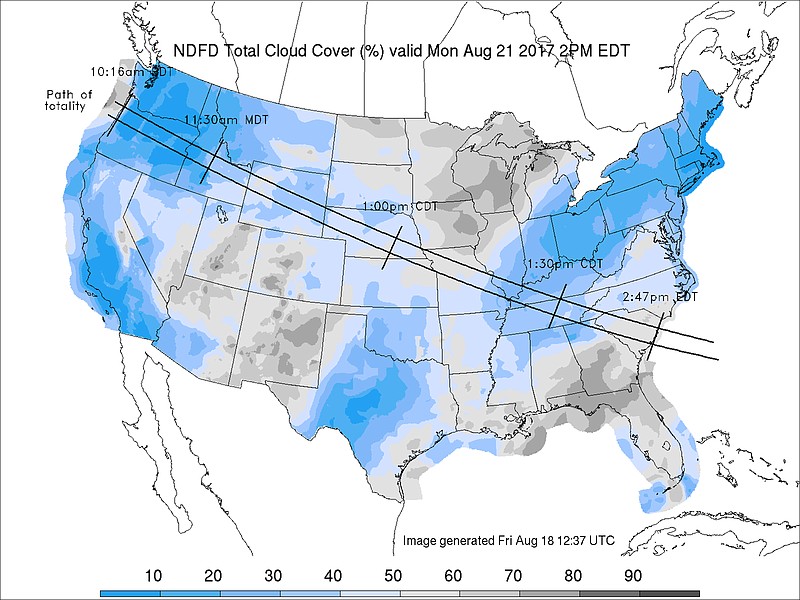For people in Chattanooga and surrounding areas, overcast skies will likely not be a significant problem for viewing the "once-in-a-lifetime" eclipse Monday afternoon.
The National Weather Service compiled historical cloud cover data for Aug. 21 in its Morristown, Tenn., forecast area, which reaches as far north as lower parts of Virginia.
The data show a 64 percent chance Chattanooga skies will be clear or have few clouds. For the whole forecast area, it showed a 28 percent chance skies will be overcast.
WRCB chief meteorologist Paul Barys said the weather looks good for the news station's viewing area.
"It looks like a typical summer day, with highs near 90 and partly cloudy skies - there may be some high clouds," Barys said. "There's a less than 20 percent chance of rain."
That applies to Chattanooga, as well as Athens and Spring City, which are located in the path of totality.
Even if clouds obstruct the view, Barys said people can expect to see the darkness caused by the moon passing in front of the sun.
"Where it's totality, it'll be almost as dark as night," he said, adding that he's never experienced a total eclipse before, but he has an idea of what it will be like.
"In Chattanooga itself, it won't get as dark because even a little bit of the sun will create enough light," he said.
Only if the clouds are totally opaque, Barys said it could be safe to look into the sky without eclipse glasses, but he said it is better that everyone wear the glasses if they plan to look at the sun.
"[You] only have two eyes," Barys said. "Just use the eclipse glasses. It's the safest way to do it. You only need the glasses if you're looking directly at the sun."
Tim Doyle, meteorologist for the NWS, said, in a way, more clouds could be a good thing because it would protect people who weren't able to get the proper eclipse viewing glasses to protect their eyes.
"That's what all the optometrists are worried about," he said.
Doyle said the NWS will be observing weather conditions in different areas before, during and after the eclipse. He said the main thing they'll be watching is the temperature changes, which Barys said is expected to drop 12 to 14 degrees in areas of totality and eight to 10 degrees in areas like Chattanooga, which will only experience 99.5 percent obscuration.
"Everybody be careful and enjoy it," Barys said. "Make sure you get out and see it. It's a once-in-a-lifetime thing."
Contact staff writer Rosana Hughes at rhughes@timesfreepress.com or 423-757-6327. Follow her on Twitter @HughesRosana.
